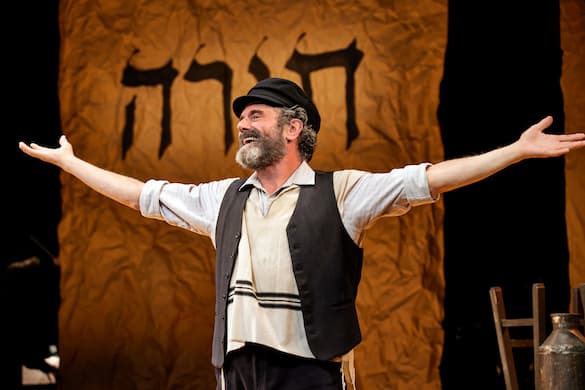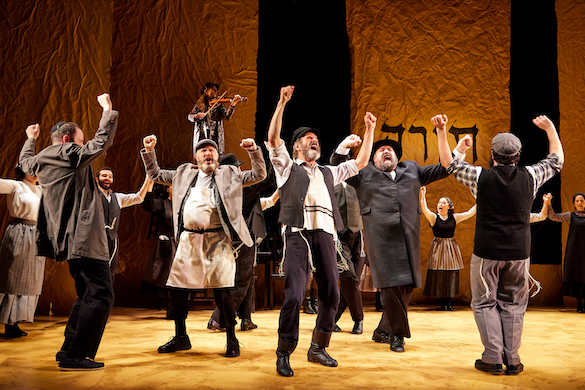Even Off-Broadway, ‘Fiddler’ Is a Joy for All
The positive of this minimalist production is being able to experience a classic work so close up; from virtually any seat in the orchestra, Tevya (Steve Skybell) seems barely 20 feet away.

The comedian Alan King (born Kniberg) told a great story about taking his mother to see “Fiddler on the Roof” during the original Broadway run. Mama Kniberg, who had grown up in the Russian shtetls before immigrating to the New World, not surprisingly loved it. When they discussed the show afterward, King asked her, “Well, Ma, was this what it was really like in the old days in the old country?” She answered: “Pretty much, although I don’t remember quite so much singing and dancing.”
She no doubt would have loved the current Off-Broadway revival, which runs until the New Year at New World Stages. (It just occurred to me that the name of the venue is surprisingly appropriate.) It’s not only an excellent production, but it’s in Yiddish, the language that the characters would have been speaking in that time and place about which Sholem Aleichem wrote the original Tevye stories, the source for “Fiddler.”
The Yiddish proved no problem for me, though I don’t speak more than a “bissel” of the language. That’s because I know every line of the show: Sheldon Harnick’s lyrics and Joe Stein’s dialogue, not to mention every note of Jerry Bock’s music. Even if I didn’t, both an English and a Russian translation are projected to the right and left of the action. The intertitles are so comprehensive that they even spell out Tevye’s “scat” phrases during “If I Were A Rich Man” — all the “biddy biddy bom”s and “deedle daidle”s. The song is performed here as “If I Were Rothschild,” which is closer to the literary source.
It’s a somewhat minimal production, as “Fiddler” can be; gone are the epic 1964 Boris Aaronson sets inspired by the Marc Chagall painting that also gave us the title of “Fiddler.” The positive is being able to experience a classic work so close up; from virtually any seat in the orchestra, Tevye (Steve Skybell) seems barely 20 feet away. Joel Grey’s direction is dynamic and lucid, and “Fiddler” geeks are well aware that this is something of a legacy project for Mr. Grey in that his father, the veteran clarinetist, comedian, and bandleader Mickey Katz, made one of the great instrumental albums of the “Fiddler” score (1965).
Watching such an intimate production — it almost feels like immersive theater — one notices details like the height of the cast members: the three main daughters are progressively shorter relative to the age of the characters; this is truly a family that believes in the law of diminishing returns. The oldest, Tsaytl (Rachel Zatcoff), truly towers over her love interest, Motl (Ben Liebert), which makes him even more sympathetic when confronting Teyva. (On that subject, props to Danny Burstein in the 2015 Broadway “Fiddler,” who played him as a kinder, gentler Tevye, more like the character in the original stories.)
While the current production, which opened at the Museum of Jewish Heritage in 2018 and then at Stage 42 in 2019, may be minimalist, one area where it does not stint is the pit orchestra, conducted by Zalmen Mlotek; with 10 musicians, it sounds very full. The cast album is also especially generous, containing two hours of music, including songs that were in the original production but were squeezed off most of the previous cast albums, such as “The Rumor / I Just Heard” and “Chavaleh (Little Bird).” All the instrumental dances and transitional passages are also included.

“Fiddler” mavens will really geek out over all the bonus tracks on the second disc. A ton of extra songs — enough to reconstruct an entire “Alternate Fiddler” — were written by Bock and Mr. Harnick (who turns 99 in April) while the work was in various phases of creation. Virtually all of them are here, performed by an impressive roster of current theater names, including Richard Kind and Tom Wopat, both of whom I hope will play Tevye in the future. (I can just see Mr. Wopat as “The Dybbuk of Hazard.”)
Mr. Harnick himself sings “A Butcher’s Soul,” originally written for Lazar Wolf, and “Dear Sweet Sewing Machine,” by Austin Pendleton and Joanna Merlin, the original Motl and Tsaytl. Joel Grey steps in front of the microphone to sing “When Messiah Comes,” written for the Rabbi at the end of Act Two.
My only complaint regarding this production isn’t actually a complaint at all. There were three very loud ladies sitting behind me, chatting away in Russian, oblivious to everyone else in the theater. Despite the best efforts of ushers and other shushers, they refused to be silenced. At one point they even snapped back at one of the would-be shushers, “This show isn’t for you.”
The rest of us could only assume that this meant that because they were Russian Jews, they had the right to converse as loudly as they wanted. They were wrong about that, on every level. In fact, just last week I met a Catholic immigrant from Colombia who says he has seen every production of the last 20 years multiple times, and especially loves the Yiddish version, which only underscores that “Fiddler” is for everybody.

